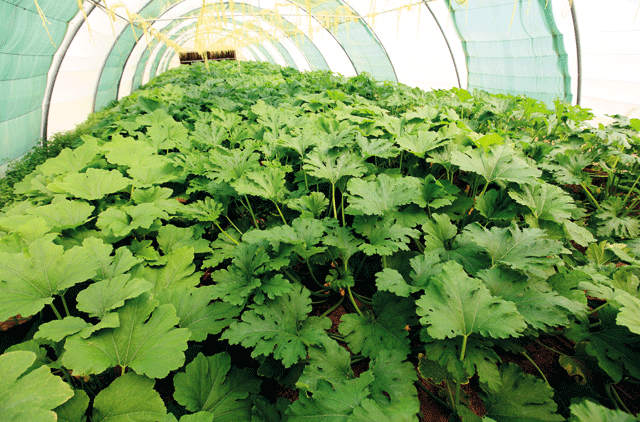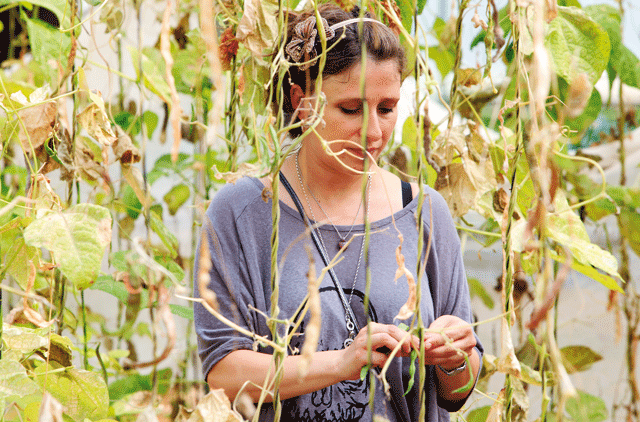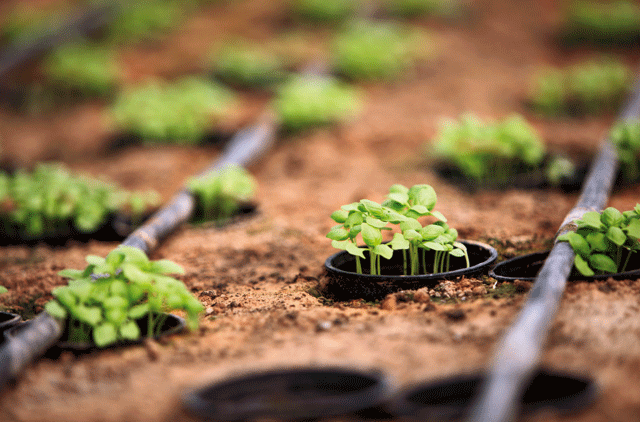
Many of us are surely aware of organic food and its health benefits. But few people consider purchasing organic food a priority because they feel it's just not affordable. Bavarian-born Elena Kinane hopes to change that.
"I came to Dubai 14 years ago, as a struggling student to save up some money, and like a lot of expatriates, I ended up staying here. I want to be able to bring up my children as healthily as I possibly can, and this motivated me to find a way to do so."
Kinane is one of very few mothers who realise the dangers of eating conventionally farmed food when raising a child or when pregnant, a rather worrisome trend given that contaminants pose the greatest risk to children and foetuses. (The National Academy of Sciences reports that even low-level pesticide exposure is more damaging to foetuses and children because their young livers and immune systems are less able to eliminate toxins; while pregnant women can put further strain on their already taxed organs.)
Kinane is brimming with health, despite having recently given birth to her second child Aidan. "The delivery was really easy, something I strongly attribute to my healthy lifestyle," she says, a lifestyle that includes living as close as possible to nature in the modern world.
Keen to make a difference in the way people purchase produce, Kinane joined hands with Abdullah Saeed Belhabb in Dubai to develop the Nazwa Organic Farm. Located off the Dubai-Hatta road, the 41-acre farm began in 1999, when Belhabb, inspired by the progressiveness of ‘grow houses' in Bavaria, decided to implement these methods in the UAE.
"I'd known Abdullah for 13 years and at the time [of meeting him] I was extensively researching health and nutrition and considering doing a degree in that field. I [used to] import a lot of organic food from Europe. However, I wanted to provide my family with fresh, locally-grown organic food. Abdullah had been running the farm on a smaller scale for his own consumption and any excess was going to his family and friends."
They joined hands to expand operations to bring the produce to a larger market and Kinane got involved in every aspect of the business, from designing the logo and developing the farm's image to experimenting with composting and crop cohabitation. For the last year and a half, Kinane has been working to bring a wide range of produce to the public, starting with her local community at Arabian Ranches and now the larger community with the establishment of their first retail outlet in Umm Suqeim recently.
At first, the farm was largely experimental, as they worked together with the farm engineer, Azzam Mubarrak, on different crops and composting methods. "We do our own composting which comprises plant waste, as well as manure of goat/chicken (none of which are killed for meat).
We found that certain plants flourish with various composting mixes, while others fail," Kinane says. Thus their operation grew out of trial and error as they strived to improve and perfect their growing methods.
The tomatoes and cherry tomatoes grow so densely in the farm that making your way through the plants is like walking through a thick forest. The cherry tomatoes are temptingly red and I pick one and eat it right off the vine. As I expected, it is as delicious as it looks. Using no chemicals or pesticides whatsoever, the Nazwa Organic Farm holds true to its promise of ‘Fresh Produce Grown with Love'. Azam, the farm engineer, joins us as Kinane inspects the produce, while relating rapid-fire instructions to him as we walk. A Palestinian, he is used to working in dry climates with uncooperative, nutrient-depleted soil and his connection to the farm is evident in his clear pride in his work. Indeed, in conventional farming, it is often the workers who bear the highest cost through daily exposure to pesticides, insecticides and chemical fertilisers.
Growing up with a love for nature
"I have happy childhood memories of helping out in [my mother's] huge vegetable garden. We lived in the countryside and used to ride our bikes all day with a picnic basket full of sandwiches for lunch. It was such a free and liberating way of life." She recalls the green movement that was on in Europe while she was growing up and how children were taught at school about recycling and caring for the planet.
"We were the first generation to grow up with these values and it's influenced my whole life. Being eco-friendly is now such a large part of who I am. It's sad to see how different the modern child's life is today in comparison to [our's]," she says. Kinane left Bavaria at 18, and went to England to study Economics and Marketing. She worked as a tour guide throughout her studies, which caused her grades to suffer. However, she found the degree really wasn't her passion and after doing a three-month internship at an office, decided she wouldn't want to do it for the rest of her life.
After moving to Dubai, she initially worked as a stewardess and then pursued other work opportunities, while also taking a degree in modern history from the University of Exeter. Though she found it stressful working and studying full-time, it was still "highly enjoyable'' and she now rates history and nutrition as her two biggest passions.
Raising a healthy family
Kinane and her husband, an Irishman who works for Emirates, met in Dubai ten years ago. "He used to subsist on a diet of white bread, cheese, eggs and Frosties, but he now has the healthiest diet of all his friends," she says. Her eyes light up as she talks about her little girl, Saoirse, who is the picture of health. "She's only been sick once with pneumonia and has not suffered from any kind of illness. I get such a sense of fulfilment and purpose when I see her eating capsicums straight off the plant like apples. She loves eating fresh [herbs] as she follows me around the grow houses as well."
Everything in their house is organic, from the cleaning products to the toiletries even the make-up she wears. "All our waste is recycled. Despite how young she is, even Saoirse knows the difference between the paper and plastic recycling bin," she says. "Health is my absolute priority and that extends not just to what I feed my family but also to the environment around me, as well as what I use on their skin."
Kinane tells me that her daughter has already been exposed to less healthy practices at birthday parties and through friends and the environment around her. "I've tried to instil sensible ideas into her from an early age so she can make her own choices. I think parents in the end have the most vital influence and it's what you learn at home that's most important." Kinane emphatically tells me how she personally links disease today with the food we, as a society, eat. "It's incredibly important to eat local, organic food and I want to ensure that families in Dubai can afford to do so, not just as a treat, but as a lifestyle," she says.
A supermarket culture
Kinane believes in most countries in the modern world, we've developed what she terms a ‘supermarket culture'. "People want everything to be available at all times and would prefer to buy something ready-made or pre-chopped and wrapped in plastic despite the loss of nutrients. People are quite literally spoilt for choice, and rate convenience to be more important than nutrition, a trend I find very sad," she says. Due to the seasonal nature of the produce and the unique condition of the climate and nature of organic farming, some customers are displeased when they cannot meet all their grocery needs. "But overall the feedback has been positive.''
For instance, the farm was producing strawberries but currently they're out of season and can't be grown until September again. "People are becoming more flexible as they come to realise our operation is different from that of a supermarket," she says.
"Organic farming is very different from conventional farming as it's a lot slower and more temperamental. Our produce ripens at different stages and thus we harvest at different stages. Then if we have a problem with pests or due to climate change, we don't try to rescue the crop, we will just have to throw it out which means that a certain vegetable simply won't be available. Our customers have to be very flexible, and for the most part are very understanding," she says.
Elena has turned down offers from supermarkets who want to stock their produce, and even from groceries overseas wishing to import, as she feels it's essential to remain true to their values, which means providing the freshest and healthiest produce in an environmentally-friendly way.
Running an eco-friendly farm
"We grow for the local market, thus have the shortest food mileage in the region. By not working with third-party providers, we ensure that our produce is the freshest it can possibly be, and can keep our prices low," Kinane says.
Being environmentally-friendly is a very important part of what they do, as they wish to ensure the farm is sustainable in the long term. The farm uses minimal water and electricity, is as energy-efficient as possible and they hope to generate awareness about sustainable lifestyles. Everything is done by hand, reducing their reliance on oil. Furthermore, the farm does not use desalinated water, as they have nine wells, four of which are sweet water, further contributing to the operation's energy-efficiency.
The grow houses are cooled by air conditioners and fans as well as humidifiers, which halves their energy use. Commonly used in India to cool houses, humidifiers are very environmentally-friendly as they use no electricity. Kinane explains how it's been surprisingly difficult to convert the farm to renewable energy. "I've been struggling to find a supplier who can provide the quantity of solar panels we require," she says in frustration.
The importance of soil
The farm is certified by the Ministry of Environment and Water, which awarded it the first Golden Certificate in the UAE, after thoroughly testing the soil quality at their premises every month for two years at three different levels: ground level, 60cm depth and 120cm depth. Crop samples were tested during three different stages of growth to pick up any traces of chemicals, of which there were none. The standards for Organic Farming in the UAE are comparable to anywhere else in the world.
Elena believes if the soil is healthy and strong there will be few weeds or pests. This is achieved though cohabitation, composting and crop rotation. Using cohabitation methods, otherwise known as companion growing, certain crops are grown together to minimise disease and insects. Kinane points out the parsley, which offers natural protection from pests, growing happily between carrots or lettuce. Other combinations they've had success with are eggplant and cabbage; and cherry tomatoes and peppers.
Composting is another essential ingredient to healthy soil, and at Nazwa Farm they continuously experiment with combinations of organic manure and plant waste to find out what works best. Finally crop rotation ensures the soil has time to rest and recover. To do this, the fields are completely cleared and left to ‘rest' and ‘breathe' for up to two weeks before they plant a different crop. And it's done again every year for a period of at least a month to ensure that the soil is the absolute best it can be. "We hold the record for soil quality in the UAE, and to keep the soil's natural balance is our long-term goal. Soil is like an immune system, if neglected, the plant simply cannot flourish".
It's testament to their soil's quality that despite their desert location, Nazwa Organic Farm yields a surprisingly large range of produce. This comprises courgettes, chillies, garlic, lettuce, onions, cucumbers, beans, peppers, cabbages, asparagus, aubergines, okra, potatoes, spinach, tomatoes (including cherry tomatoes), broccoli, carrots, fennel, beetroot, strawberries, a wide selection of herbs and also includes free-range eggs.
Out of those items, bell peppers, strawberries (currently out of season), spinach, lettuce and tomatoes are currently on the Environmental Working Group's (EWG's) Dirty Dozen list. The EWG's Dirty Dozen lists the produce exposed to the highest levels of pesticides and recommends that consumers opt for organically grown when it comes to these items.
"Our supply depends on what we harvest as everything grows seasonally. But consumers are guaranteed only the freshest of produce - harvested at 4am in the morning, it's in the shop by 10am."
Kinane's passion and enthusiasm for her work is evident in the intensity with which she talks and her extraordinary commitment to working hard, doing whatever it takes to get the job done. "I wake up at 5am and work till 10pm, taking the kids with me wherever I go," she says.
Plans for the future
Kinane is eager to teach the next generation about organic farming and sustainable living, and in the future hopes to invite schools and interested members of the community to the farm. However, Elena cautions that this would be by invitation only. "Our first priority is to ensure the quality of the produce and thus we have to keep outside influences limited to maintain the soil's integrity," she says.
elena's top diy tips
According to Kinane, you can definitely grow your own organic fruit and vegetables in Dubai, whether it's in your garden or even on your balcony. All you need to do is to prepare your soil properly and do your own composting. She recommends recycling the kitchen waste with Bokashi indoor organic composting systems. "I'd definitely advise that you research what seeds grow well in hot climates. For example, organic seeds from India tend to grow well in Dubai." She cautions that it's difficult to grow in summer unless you're a professional, so wait till the cooler months (from September) to start farming. In the meantime, conduct your research and see what combinations work best. "Vegetables like tomatoes, potatoes, sweet potatoes, aubergines and courgettes grow well here." Kinane also believes filtering water to be an essential part of their success. "But above all, be patient and don't expect miracles. Preparing your soil is key and it takes several trials to get it right".
Do you know of an individual, a group of people, a company or an organisation that is striving to make this world a better place? Every responsible, selfless act, however small or big, makes a difference. Write to Friday and tell us who these people are and what they do. We will bring you their stories in our weekly series, Making A Difference. You can email us at friday@gulfnews.com or to the pages editor at araj@gulfnews.com
Benefits of local organic food
- It's fresh, contains no preservatives to make it last longer
- More nutrient-rich
- Harvested only when ripe
- Tastes better
- Encourages home cooking
- It's better for the environment
- Increases soil fertility
- Uses less energy
- Lower food mileage
- Less packaging
- Better conditions for farm workers
- No exposure to harmful effects of pesticides, fertilisers and insecticides
- Strengthens local economy, money stays within the community
- Less advertising and marketing costs
- Less processing
- Free from genetically modified organisms or seeds
- No chemical pesticides













